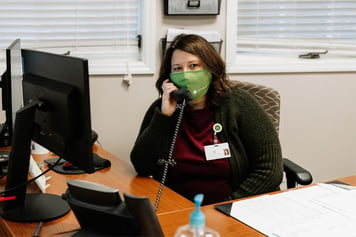Patients and their families have the freedom to choose the hospice care provider that best meets their needs. While most hospice agencies work within Medicare’s guidelines and offer the same basic services, there are important differences that may impact the quality of care your loved one receives.
The best way to make an educated choice is to ask questions. Here are a few factors to consider when comparing hospice agencies, along with important questions to ask during your first informational meeting or phone call:
1. Medicare Certification
For hospice care costs to be covered by Medicare, you’ll need to choose a hospice agency that is Medicare-certified. Certification also means the hospice follows Medicare rules and regulations.
Key Questions to Ask Hospice:
- Are you Medicare certified?
- Are there any out-of-pocket costs?
[action 1]
2. Recently Surveyed
Hospice agencies should be regularly surveyed by a state or federal oversight agency. These surveys ensure the hospice meets certain quality standards.
Key Questions to Ask Hospice:
- When were you last surveyed?
- Were there any deficiencies noted? If so, have they been resolved?
3. Patient Satisfaction
Many of the best hospice agencies survey families about their satisfaction with the hospice services their loved one received. This data can give you a sense of the hospice provider’s quality of care and the bonds they develop with their patients.
Key Questions to Ask Hospice:
- How do patients and families rate your hospice services?
- What is the process if a patient or loved one has an issue or concern?
4. Emergency Availability 24/7
Some hospice providers have staff on-call 24 hours a day, seven days a week, including holidays, to visit your home if there’s an emergency. This allows you to stay safe at home rather than go to a hospital, whenever possible.
Key Questions to Ask Hospice:
- Are hospice staff available 24/7 for home visits in an emergency?
- Which hospice care team members are on-call?
- What is your average response time?
5. Quality Scores
To help you choose the best hospice care provider, the Centers for Medicare and Medicaid Services uses a five‐star quality rating system that measures Medicare patients’ experience. You can check hospice agencies’ Star Ratings on Care Compare.
Key Questions to Ask Hospice:
- How do you measure quality?
- What are your quality scores, and how do they compare to the national average?
6. Staff Credentials
Clinical staff should have appropriate education and licensure for their position. They should also receive ongoing training so they remain up-to-date on the latest research and developments in the field.
Key Questions to Ask Hospice:
- What kind of credentials and training do your hospice team members have?
- Do any team members have special certification in hospice and palliative care?
7. Accreditation
Accreditation is not required to provide services, but it can be a strong indication of a hospice provider’s commitment to quality. Some organizations that accredit hospice agencies include the Accreditation Commission for Health Care and the Joint Commission.
Key Questions to Ask Hospice:
- Are you nationally accredited?
- Which organization are you accredited with, and what are its requirements?
8. Years in Operation
Many people prefer hospice agencies that have been in the community for several years. A long history can be a sign that the hospice care provider is trusted, well-established and experienced.
Key Questions to Ask Hospice:
- How long has the hospice agency been in business?
- How many patients do you serve each year?
9. Speedy Admissions Process
Some providers can begin providing hospice services within a few hours, even at night or on the weekend. Finding a hospice that can begin the admissions process quickly may be important to you, especially if your loved one’s condition is advanced or their health is declining quickly.
Key Questions to Ask Hospice:
- How long does it take to start hospice services?
- What is the admissions process like?
- How often can I expect the hospice team to visit?
10. Special Services
Some agencies provide specialized hospice programs for veterans or people with specific conditions such as end-stage dementia.
Key Questions to Ask Hospice:
- Are you a member of We Honor Veterans? If so, what is your level of involvement?
- Do you have any specialty programs? If so, what offerings are included?
11. Any Limitations on Hospice Services
If you need pain-relieving treatments such as chemotherapy, radiation, IV antibiotics or tube feedings, or are not yet ready to sign a do-not-resuscitate order, some hospice agencies will not provide care. If you need specialized services or equipment, make sure the hospice you choose is open to discussions regarding treatment options.
Key Questions to Ask Hospice:
- Are there any services, equipment or medications the hospice agency does not provide?
12. Bereavement Support
Grief support can vary significantly from one hospice to another. Some offer basic services, while others provide education, individual counseling, remembrance events and support groups.
Key Questions to Ask Hospice:
- What types of bereavement services do you provide for families?
13. Family and Caregiver Support
Family caregivers are the primary source of support when a loved one is on hospice care at home. Some hospice agencies provide training to caregivers as well as education, support and respite care to give family caregivers a break.
Key Questions to Ask Hospice:
- What are family caregivers expected to do?
- Do you provide training and support for family caregivers?
- Do you provide respite care? How is that arranged?
14. Inpatient Care Options
If symptoms can’t be managed at home, patients in home hospice may require an inpatient stay, for example, at a hospital or nursing home. Make sure there are convenient options that will meet your needs, where you can continue receiving hospice services from the same team.
Key Questions to Ask Hospice:
- What are my options if we require inpatient care?
- Which hospitals and nursing homes are you contracted with?
These are just a few factors that differentiate one hospice from another. What matters most to you? Take the time to talk with a few providers and make an informed choice, ideally before your loved one is in crisis, so you get the services and support you need.
Is Amedisys Hospice the right choice for you or your loved one? Call an Amedisys hospice care center near you to find out.






